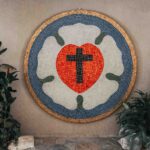A gospel coalition in northern Europe—the Nordic countries—is a unique effort in the landscape of Christendom in our region. The pragmatic efforts of intra-denominational groups (ie; the evangelical alliance in Denmark, or free church network) as well as the liberalizing ecumenical efforts of mainline churches contrast greatly with a Nordic recreation of The Gospel Coalition (TGC) in the US. This unified effort is distinct in our commitment to reformational gospel truths and by our theological vision for how the gospel can shape and reform our region of the world. This is the last in a series of five short articles devoted to naming and explicating this distinctiveness. Here are all the articles: 1, 2, 3, 4, and 5.
He who has an ear, let him hear what the Spirit says to the churches. To the one who conquers I will grant to eat of the tree of life, which is in the paradise of God. (Rev. 2:7)
For the past few months, I have been teaching an Intro to Christianity course at the Lutheran Mission house, known as Bethesda, in downtown Copenhagen. One of the attenders recently said she had been reintroduced to faith in God through the language classes and Bible studies given at Bethesda, and that she was coming closer to God through this ministry. Amazing! But she soon followed her statement with, “this mission house is my church; this is where I find spiritual belonging.” I understood the heart of what she was saying, but is a mission house the same thing as a church? The short answer is no. A church is a local fellowship of believers, exercising leadership, membership, and the sacraments.
Navigating the Christian landscape in the Nordics, I find there is a tension between ecclesiological traditionalism and Christian pragmatism, making it hard to know what it really means to be a churchman. But in TGC Norden, we want to be intentionally “for churches.” What do we mean by that?
Ecclesiological traditionalism
If we were to say we were “for the church” within our part of the world, intuitively one would assume the established, national churches of our region, as they tend to set the religious agenda. These churches gain members essentially by having people born in their parishes, with membership indicating little more than that you chose not to opt out of the 1% church tax. It is like being at a checkout line, with the cashier asking if you would like to donate an additional few kroner to a charitable cause? “Sure, that’s fine,” we might say. But would we then imagine ourselves members of this charitable organization? Most likely not.
Nordic church culture can also be driven by a democratic mindset, with many considering the most important thing about any church to be its elected board and chair, who are then able to challenge the presiding priest/pastor. Although being “for churches” is surely not less than the principles of polity and charity, we intend much more by using the phrase.
Christian pragmatism
At the same time, we see a reactionary approach in many of the large free churches of the Nordics. Desiring to distance ourselves from traditionalism, we ache for momentum and excitement using whatever latest tools from America or England will work. There are numerous examples of this, but many churches outside the national churches borrow heavily from the English-speaking world. There is an “anything goes so long as there are converts or momentum” mentality, a temptation in any part of the world to be sure. Theological principles become merely the process of putting our fingers in the air to see which way the trends are going, so that we can join, regardless of what our local church itself believes.
Defined by what we are FOR
Rather than being against any denominational or cultural Christian expression, within TGC Norden we desire to be defined by what we are for—and we are for churches. We are not merely committed to the universal church, the community of all the saved, but rather to the visible, gritty version of this that we meet in our neighborhoods and towns—we are for churches. You see, there are many gospel-centered, broadly reformed churches around the Nordics, with real people and pulpits needing support, theological and practical resources, and even coaching. This is what we are for—we are for them, the churches. We want to visit, resource, and partner with the gospel-centered churches in the Nordics.
We are for churches. We are not merely committed to the universal church, the community of all the saved, but rather to the visible, gritty version of this that we meet in our neighborhoods and towns—we are for churches.
John the Revalator was for churches
In one of the most abstract, big-picture books in all of Scripture, we see the apostle John begin concretely by admonishing and edifying churches, planted early by the apostle Paul (Rev. 2-3). John speaks directly to these churches saying, “He who has an ear, let him hear what the Spirit says to the churches” (v. 7). John takes the reader on a dream journey with him into the revelation of the very throne room of Heaven, the culmination of all things, and to the intense supremacy of Christ enthroned at the right hand of the Father, surrounded by and empowered through the Spirit’s presence. But the path into the intra-trinitarian delight and decree is through the seven letters written to churches—to elders, deacons, and members giving themselves to the routine, ordinary means of preaching, leading, baptizing, and administering communion. If we would, as v.7 invites the reader, conquer our doubts and indwelling sin, and eat of the tree of life, we must enter through the gate of ordinary people gathered together (and admonished together) as local churches.
The picture we see here in John’s Revelation avoids the generalization of broadly national Christian cultures, while also not giving into a pragmatism defined by international para-church organizations. In this sense, we believe that TGC Norden’s commitment to being “for churches,” gives us a distinct and important voice into the Christian churches and leaders in the Nordics.









